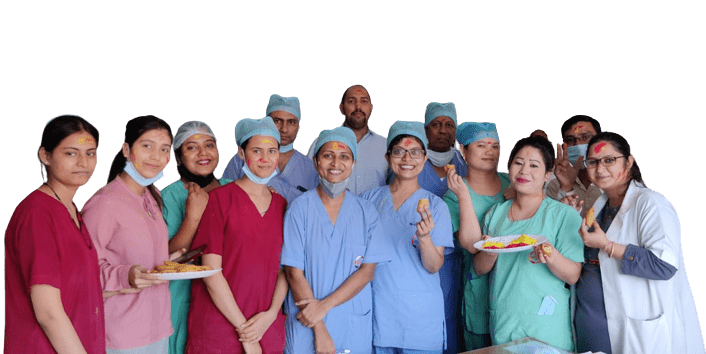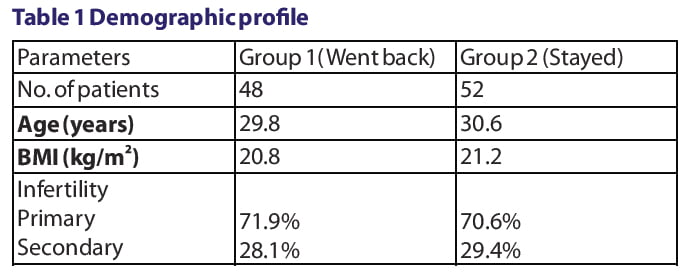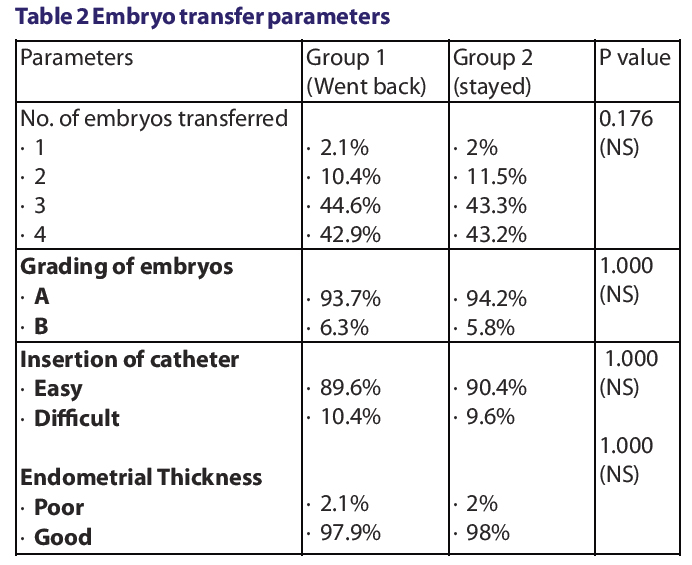Need Help?
We are here to help.
We care for each one who come to us with hope in their hearts.

The process of in-vitro fertilization (IVF) involves many important steps. Improvements in ovulation induction, oocyte retrieval and laboratory techniques to achieve maximal rates of fertilization and embryo development have resulted in at least one embryo transfer in 90 % of all cases where oocytes have been retrieved (1). Embryo transfer (ET) is the final and most crucial step of IVF. The successful pregnancy outcome is predicted by the implantation of embryo in uterus.
The process of implantation involves two main components, a healthy embryo that should have the potential to implant and a receptive endometrium that should enable implantation. The “cross-talk” between the embryo and the endometrium that finally leads to apposition, attachment and invasion of embryos is mandatory for successful implantation and subsequent normal placentation. [2.3]. Any abnormality attributed to the embryo, the endometrium or the immune system will result in implantation failure. Therefore, travelling per se will not affect any of the above factors responsible for implantation of embryo.
Earlier there were many studies to evaluate the effect of bed rest on pregnancy rates after embryo transfer. This is the first study to compare the pregnancy rates in patients who travelled to their countries with the patients who stayed back in Delhi after embryo transfer.
A retrospective analysis was done in 100 infertile females with age till 40 years who underwent IVF from January 2016 to June 2016. They were divided in 2 groups – the females who went back to their own country after 3 days of embryo transfer (48 females – Group 1) and who stayed back in Delhi (52 females – Group 2). The mean patient age, number of embryos transferred (1,2,3,4), grade (a or b), easy or difficult transfer and endometrial thickness are comparable in both the groups.
Ovarian stimulation was started on day 2 with gonadotropins, recombinant human FSH(rhFSH, Folisuge; Intas Pharmaceuticals Ltd, India or Gonal F; Merck Serono S.p.A, Italy) or highly purified menotropin HMG (hpHMG, Menopur; Ferring GmbH, Germany) in the dose of 225 to 450 IU, depending on patient prole (age, BMI, previous dose of gonadotropins) till day 6 of period followed by transvaginal follicular monitoring and dose was adjusted according to ovarian response. When follicles reached 13 to 14 mm, daily subcutaneous injection of GnRH antagonist, 0.25 mg Cetrorelix (Cetrotide, Merck Serono S.p.A, Italy), was given to trigger ovulation. Transvaginal oocyte aspiration was performed before 36 h, under ultrasound guidance, using Wallace OPU needle and Cooks gamete buffer media. Embryos were further cultured in Cooks fertilization/cleavage/ blastocyst media.
Embryo transfer was done on Day 2 in all the subjects under transabdominal USG guidance (with full bladder). After gentle insertion of speculum and suction of cervical mucus, soft outer sheath was inserted till the level of internal os. It was followed by insertion of the soft Cooks Guardia Access echotip ET catheter containing embryos in 10 mcl media and 5 mcl air bubble on both sides of the media and then 3 or 4 embryos were placed in mid uterine cavity.
Luteal support was added in the form of vaginal and injectable progesterone. Beta hcg was done after 14 days of the embryo transfer. (We had not taken the institutional review board (IRB) approval of this study as it was a retrospective study and we collected the data when their pregnancy test was already positive either they stayed or went back to their place).
The demographic prole for the patients was summarized in Table 1. The embryo transfer parameters were shown in the Table 2. All the parameters related to embryo transfer showed no significant difference in both the groups. The groups were also compared that whether they stayed in Delhi or they went back to their country by Fight affected the pregnancy rates or not (Table 3).
In IVF treatments, rest for a varying period of time is commonly recommended after embryo transfer (ET). However, the scientific basis for this practice remains to be determined. In this context we performed this research to investigate whether this advice is sound or not. In our study, the pregnancy rates were higher in females who went back to their own country.
The implantation failure is the reason of IVF failure and mechanical expulsion of the transferred embryo is a possible cause of failure of implantation. This may be the reason why most women are asked to stay in bed for several hours following ET. However, this has never been shown to be related to a higher success rate. Furthermore, an immediate return to routine daily activities, may lead to a decrease in maternal stress and anxiety following ET (4). There are studies that evaluated the effect of bed rest and mobilization following embryo transfer on the results of in vitro fertilization. Gaikwad S et al studied the influence of 10 minutes of bed rest after ET on the achievement of a live-born infant (LBI) in 240 recipients of IVF with donor eggs which showed that the bed rest immediately after ET has no positive effect and in fact can be negative for the outcome may be due to increase in stress levels (5). Küçük, M also recommended that the patients should not be encouraged to rest in bed after ET and should maintain their routine physical activities during IVF (6). Li B et al performed a systematic review and concluded that there was insufficient evidence to support the routine use of bed rest to improve pregnancy outcome in women undergoing ET in IVF cycles(7).
A systematic review of the literature was conducted which examined each of the major steps of embryo transfer. In this review,14 studies were included to assess that the bed rest or ambulation affect IVF pregnancy and live-birth rates and none of them demonstrated a benefit of bed rest after ET of any duration (8).
As we know many studies were done to evaluate the effect of bed rest on pregnancy rates after embryo transfer. This is the first study to compare the pregnancy rates in patients who travelled to their countries with the patients who stayed back after embryo transfer.
India is a growing destination for medical tourism and people from all over the globe are coming for IVF treatment to our country. We believe that encouraging patients to follow their daily routine immediately after ET or travelling back to their own place may help them to cope with anxiety and they may be more stress free due to more economical, most comfortable life with same cultural habits at their own place.
Original Research Paper Published on GLOBAL JOURNAL FOR RESEARCH ANALYSIS




We care for each one who come to us with hope in their hearts.

Disclaimer – Dr Kaberi is not associated with any Hosptial/Clinic other than “Advanced Fertility and Gyne Center (AFGC)”. AFGC has only four centers at present 1. “Lajpat Nagar” 2. “CR Park Delhi” 3. “Noida” 4. “Gurgaon“.